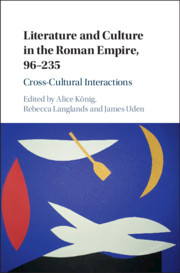Book contents
- Literature and Culture in the Roman Empire, 96–235
- Literature and Culture in the Roman Empire, 96–235
- Copyright page
- Contents
- Figures
- Contributors
- Preface
- Timeline
- Abbreviations
- Map
- Introduction
- Part I Refiguring Roman and Greek Interactions
- Chapter 1 Beyond Romans and Others
- Chapter 2 The Noise-Lovers
- Chapter 3 Plutarch and Roman Exemplary Ethics
- Chapter 4 Patronage, Cultural Difference and Literary Interactivity
- Chapter 5 The Romance of Republican History
- Chapter 6 Tactical Interactions
- Part II Imperial Infrastructure: Documents and Monuments
- Part III Cultural Translation and Transformation
- References
- Index
Chapter 1 - Beyond Romans and Others
Identities in the Long Second Century
from Part I - Refiguring Roman and Greek Interactions
Published online by Cambridge University Press: 28 April 2020
- Literature and Culture in the Roman Empire, 96–235
- Literature and Culture in the Roman Empire, 96–235
- Copyright page
- Contents
- Figures
- Contributors
- Preface
- Timeline
- Abbreviations
- Map
- Introduction
- Part I Refiguring Roman and Greek Interactions
- Chapter 1 Beyond Romans and Others
- Chapter 2 The Noise-Lovers
- Chapter 3 Plutarch and Roman Exemplary Ethics
- Chapter 4 Patronage, Cultural Difference and Literary Interactivity
- Chapter 5 The Romance of Republican History
- Chapter 6 Tactical Interactions
- Part II Imperial Infrastructure: Documents and Monuments
- Part III Cultural Translation and Transformation
- References
- Index
Summary
This chapter aims to spur reflection on the categories we use to analyse how second-century texts negotiate questions of identity and difference. The first half compares modern and ancient usage of the category ‘Romans’. Modern scholarship often deploys the category ‘Romans’ in a manner that assumes both that its content is self-evident and that a distinction between ‘Romans’ and ‘non-Romans’ was one of the most salient divisions within the population of the empire. Both of these assumptions are problematic, especially (but not only) for the second century. The second half of the essay suggests that our focus on the category ‘Roman’ reflects unexamined assumptions about how contemporaries imagined the imperial order. We tend to approach the topic with a conceptual apparatus based on our own experience in a system of nation states, even though identities were organised differently in a context in which the city-state was the hegemonic form of political organisation and larger aggregations took the form of empires. Imperial society remained riven by horizontal and vertical divisions. The category ‘Romans’ is inadequate both for our own analysis of the structure of imperial society and for our exegesis of the complex gestures of inclusion and exclusion made by contemporary texts.
Keywords
- Type
- Chapter
- Information
- Literature and Culture in the Roman Empire, 96–235Cross-Cultural Interactions, pp. 37 - 57Publisher: Cambridge University PressPrint publication year: 2020
- 5
- Cited by

